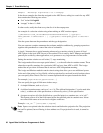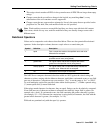
Setting Event Monitoring Criteria
Issue 1.0 June 2002 31
This assign criteria watches all EDUs in the system because all EDU IDs are longer than empty
strings.
Change events that do not reflect a change in the loginid, any matching data.*, or any
subcontainer of the call container are also suppressed.
Change events that not suppressed are trimmed to list only the names that are provided on the
projection list. The duid, time, and modifier fields are also provided.
Note: Watch and drop events are not modified and they are always sent with their full content.
User events, which are very rare, would be modified as they are actually change events with a
different name.
Relational Operators
Values can be compared to each other as described below. There are four permissible relational
operators. In the description column, the term couple refers to a name/value pair.
The ADU Server compares the name/value data within an ADU against the criteria string one
character at a time, starting with the leftmost character, until either a mismatch occurs or one field
runs out of characters. Comparisons are case-sensitive. “Foo” is not the same as “foo” or “FOO”.
To avoid ambiguity, enclose the specified value within double quotes (“”). Within a quoted string,
(\") means quote and (\\) means backslash.
If the strings match character for character, they are equal. Strings can also be relatively compared.
If one field runs out of characters without a mismatch, the relatively longer field is greater (for
example, abc < abcd). If a mismatch occurs, the field containing the greater character is greater,
(for example, 111 < 119). Because the comparison is string-based, not numeric, the field with the
greater initial character is greater, (for example, 2 > 119).
Wildcards are permitted only with the equal (=) operator.
Symbol Definition Description
= equal Find a couple that matches the specified name and value.
Wildcards are accepted.
< less than For a given name, find all couples with values less than the
specified search value (string-based).
> greater than For a given name, find the set of couples with values
greater than the specified criteria (string-based).
: exactly equal to For a given name, find a couple that exactly matches the
specified value. Wildcards are not accepted.
# not Expressions are not equal to each other.


















